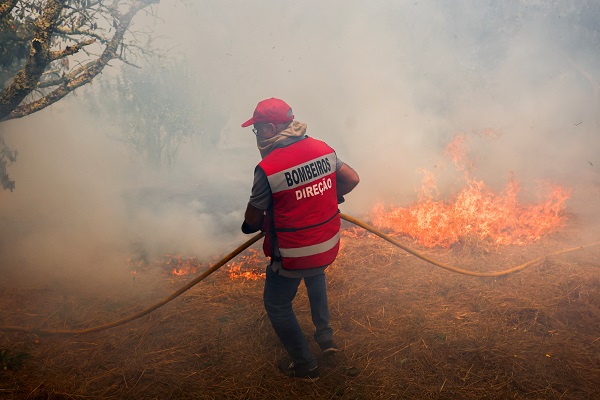 A firefighter works to extinguish a wildfire in Penalva do Castelo, Portugal, 16 September 2024;
Credit: Reuters/Pedro Nunes
A firefighter works to extinguish a wildfire in Penalva do Castelo, Portugal, 16 September 2024;
Credit: Reuters/Pedro Nunes
PENALVA DO CASTELO, Portugal (Reuters) - At least two people died as wildfires raged in central and northern Portugal on Monday 16 September 2024, forcing authorities to evacuate villages, close motorways and ask the European Union to send more water-bombing aircraft.
The situation was most dangerous in the northwestern Aveiro district where one forest blaze reached the outskirts of the town of Albergaria-a-Velha and burned several houses, the mayor said.
More than 1,100 firefighters were battling that fire and three others in the surrounding area. Police shut a stretch of the main highway between Lisbon and Porto as thick smoke blanketed the area.
Police said officers had found the remains of a man who had apparently been working for a forestry company nearby.
In the same area, another person died of a heart attack as the fire approached, and two people were in hospital with serious injuries, according to the civil protection service.
Authorities said they had deployed twelve water-bombing aircraft in that district and were fighting at least 20 fires across the country.
The government requested eight more aircraft from the European Commission under the EU civil protection mechanism known as RescEU.
Two arrived from Spain, and two were expected from France, an Interior Ministry spokesperson told Reuters. Greece said it would send two Canadair CL-415 planes.
The situation would likely get worse amid unusually dry conditions and wind gusts of up to 70 km/h, national emergency and civil protection commander Andre Fernandes said.
He planned to maintain the current special red alert status across mainland Portugal.
Albergaria-a-Velha Mayor Antonio Loureiro told reporters the fire had burned down four houses and was threatening 20 more as it raged in the industrial and residential perimeter of the town of around 25,000 people.
Temperatures topped 30 degrees Celsius across the country over the weekend and Monday, and were expected to stay high into Tuesday 17 September 2024.
Portugal and neighbouring Spain have recorded fewer fires than usual after a rainy start to the year. But both remain vulnerable to the increasingly hot and dry conditions that scientists have blamed on global warming.








